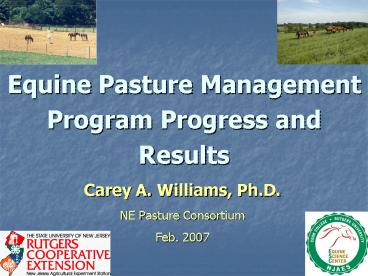Equine Pasture Management Program Progress and Results - PowerPoint PPT Presentation
1 / 23
Title:
Equine Pasture Management Program Progress and Results
Description:
Assisting the Impact of Horse Manure and Composted Manure on Soil and Water Quality ... Plots will be treated with manure, compost or control ... – PowerPoint PPT presentation
Number of Views:47
Avg rating:3.0/5.0
Title: Equine Pasture Management Program Progress and Results
1
Equine Pasture Management Program Progress and
Results
- Carey A. Williams, Ph.D.
- NE Pasture Consortium
- Feb. 2007
2
Horse Manure to Bioenergy Technology for On-Farm
or Regional Application
- Donna Fennell, Ph.D.
- Objectives
- To develop feasible on-farm or regional
facilities for converting horse waste into
methane and hydrogen through the anaerobic
digestion process - To establish design and economic parameters that
would enable horse owners to benefit from biofuel
production at the farm level
3
Horse Manure to Bioenergy
- Research goals
- Examine long-term operation of methanogenic
anaerobic digesters with horse waste - Improve efficiency and yield of anaerobic
digestion of horse manure by co-amendment with
other biomass, pretreatment and optimization of
retention times
4
Horse Manure to Bioenergy
- Research Goals
- Design and prepare a work plan for installation
of a pilot-scale anaerobic digester to be
installed at RU - Prepare materials and educate industry about
technology - Carry out an economic assessment of potential
application of technology
5
Assisting the Impact of Horse Manure and
Composted Manure on Soil and Water Quality
- Daniel Gimenez, Ph.D. Stephanie Murphy, Ph.D.
- Objectives
- Document changes in the soil system introduced by
the addition of horse manure and composted manure
on NJ soils - Knowledge generated by this project will assure
the adoption of proper techniques for maintaining
optimum soil and environmental quality when horse
manure is spread
6
Impact of Horse Manure
- Research goals
- Field crop, forage, and horticultural plots will
be set at NJ farms - Plots will be treated with manure, compost or
control - Samples collected will monitor soil water content
and movement (ECH2O probes and fluxmeter) - Soil samples will also be evaluated by soils lab
- Outreach will include fact sheets and educational
seminars
7
(No Transcript)
8
Managing Manure on NJ Horse Farms Adapting Near
Infrared Reflectance (NIR) Spectroscopy for Rapid
horse Manure Analysis
- Michael Westendorf, Ph.D.
- Objectives
- Adapt NIR procedure for analyzing
- horse manure
- This procedure should decrease cost and increase
ease of completing manure tests - This will enable horse producers to conveniently
and economically sample horse manure to
incorporate test results into CNMPs
9
Managing Manure on NJ Horse Farms
- Research goals
- Collect about 100 samples of horse manure from
around the state - Bedding will vary
- Wet chemistry (DairyOne) will help calibrate NIR
horse manure equations - Seasonal manure samples will be compared
- Compare manure of horses on varying levels of P
in diets (controlled study) - Outreach will consist of traveling NIR unit for
seminars, fact sheets, etc.
10
Creation of an Environmental BMP Showcase at
Rutgers
- Develop and maintain a demonstration working
horse farm by implementing BMPs - Provide learning experiences and educational
programs in - Pasture, storm water, and manure management
11
Educational Programs
- Learning opportunities will include
- Venue for pasture research oppertunities
- On farm demonstrations and workshops
- Twilight meetings
- Short courses
- Fact sheets, newsletters, website info, articles
- Topics covered
- Pasture management, manure storage and removal,
water quality and managing stormwater and
ag-water runoff
12
The Challenges
- The pastures were VERY wet, and had not been soil
tested or fertilized - The site had been over-stocked and intensively
grazed for many years -- soils are very compacted - Most high quality forages had been eliminated
from the pastures
13
The Challenges
- The large fields had not been mowed for many
years, and contain tough perennial weeds - The number of horses anticipated at the farm
requires a rotational grazing plan in order to
maintain ground cover and forage quality - More manure is generated at the facility than can
be spread on fields and pastures
14
- www.esc.rutgers.edu
15
(No Transcript)
16
(No Transcript)
17
(No Transcript)
18
(No Transcript)
19
Sustainable Pasture Management for Horses
- The Mid-Atlantic Equine Pasture Initiative
(MAEPI) was funded by NE SARE - Train extension agents, governmental agency
employees and other industry professionals to
serve as informed field consultants and advisors
to horse farm owners and managers in Mid-Atlantic
Area
20
MAEPI
- 3-year program to increase outreach and
assistance to this clientele, improve their
knowledge, and adopt practices to improve pasture
quality and reduce environmental impact - Elements included
- Training meetings
- Training materials
- Web, video and other materials
21
MAEPI
- Other educational elements
- Univ. of MD demonstration horse farm
- Farm and Land Management Short Course at HORSES
2007 - 4-H training module and activity guide
- Other regional meetings
22
University of Connecticut
- Jennifer Nadeau, Ph.D.
- Active participant of the Horse Environmental
Awareness Program (HEAP) - Recently gathered data measuring the effects of
drought, heat, and other environmental conditions
on nutrient content of pasture grasses and their
effects on insulin resistance in horses - Collaborating with RU
23
Thank You!
Carey Williams, Ph.D. Equine Extension
Specialist cwilliams_at_aesop.rutgers.edu www.esc.rut
gers.edu































